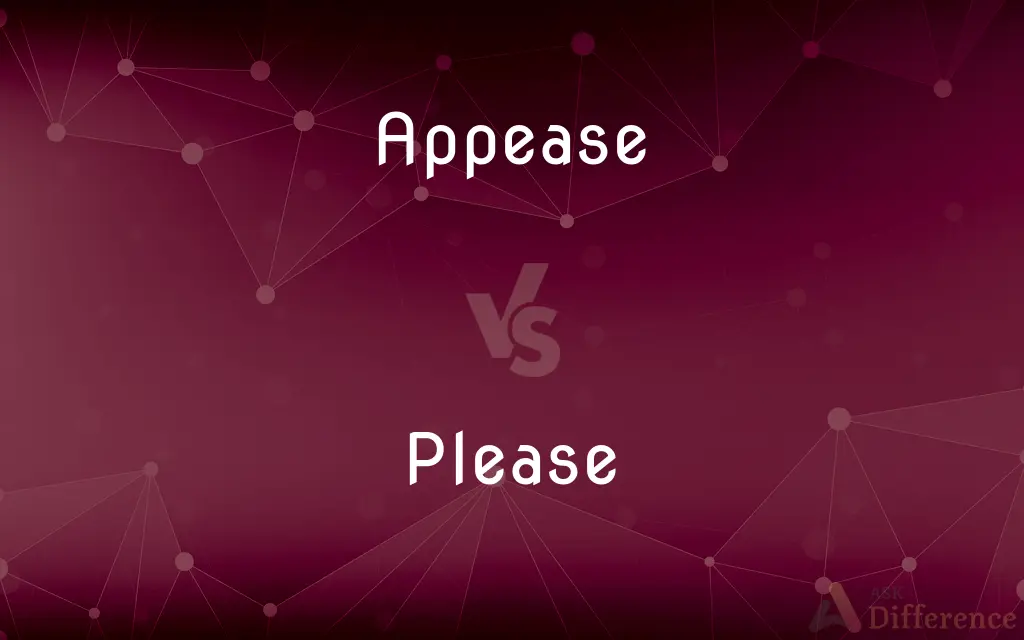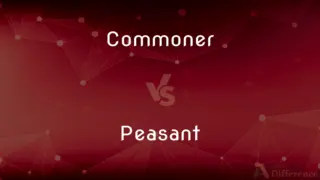Appease vs. Please — What's the Difference?
By Maham Liaqat & Urooj Arif — Updated on April 8, 2024
Appease focuses on pacifying or mitigating anger or conflict, while please is about giving pleasure or satisfaction.

Difference Between Appease and Please
Table of Contents
ADVERTISEMENT
Key Differences
Appease often involves making concessions to bring about peace, especially in a context where there's tension or conflict. It's about addressing concerns or demands to reduce hostility. For example, a government may appease a population segment by agreeing to some of their demands to prevent further unrest. On the other hand, to please someone is to bring them joy, satisfaction, or happiness without the implication of resolving conflict. It's about actions or behaviors that are designed to make someone feel good or happy. A parent might buy a toy to please their child, focusing purely on the child's happiness.
Appeasement can sometimes carry a negative connotation, suggesting compromise or the giving in to demands that might not be in one's best interest, often to avoid conflict. It's a term frequently used in political or diplomatic contexts. Whereas pleasing is generally seen in a positive light, as it's associated with kindness, thoughtfulness, and efforts to make others happy. It can be a simple, altruistic act without the complexities or implications of appeasement.
In appeasement, the focus is more on the act of calming or pacifying a potentially volatile situation or person. It's strategic, aimed at prevention or resolution of hostility, and might not always align with one's desires but is chosen as the lesser of two evils. Please, however, centers on the emotional response elicited in another, stemming from positive actions or words. It's less about strategy and more about genuine desire to make another person feel valued or happy.
Comparison Chart
Primary Goal
To mitigate conflict or pacify dissatisfaction
To bring joy or satisfaction
Context
Often used in tense or conflict-ridden situations
Generally used in positive or neutral contexts
ADVERTISEMENT
Connotation
Can be negative, suggesting compromise
Positive, associated with kindness and happiness
Focus
On the act of calming or pacifying
On eliciting a positive emotional response
Outcome
Resolution of tension or conflict
Increased happiness or satisfaction
Compare with Definitions
Appease
Pacify or placate (someone) by acceding to their demands.
Authorities appeased the dissenters by agreeing to some concessions.
Please
Cause to feel happy and satisfied.
The performance pleased the audience greatly.
Appease
Make (someone) less angry or hostile.
They attempted to appease the protesters with a promise of reform.
Please
To desire or wish to do something.
Do as you please with the gift.
Appease
To cause to subside; to diminish or mitigate.
They took measures to appease the public outcry.
Please
Be agreeable to (someone).
The proposal should please all parties involved.
Appease
Relieve or satisfy (a demand or a feeling).
They ate to appease their hunger.
Please
To be willing to do something.
She was always pleased to help her friends.
Appease
To bring to a state of peace or contentment.
He gave in to the demands to appease his critics.
Please
To give pleasure or satisfaction.
The scenic view pleased their eyes.
Appease
To placate or attempt to placate (a threatening nation, for example) by granting concessions, often at the expense of principle.
Please
Cause to feel happy and satisfied
It pleased him to be seen with someone in the news
He arranged a fishing trip to please his son
Appease
To calm, soothe, or quiet (someone)
Appeased the baby with a pacifier.
Please
Take only one's own wishes into consideration in deciding how to act or proceed
This is the first time in ages that I can just please myself
Appease
To satisfy, relieve, or assuage
Appease one's thirst.
Please
Used in polite requests or questions
Please address letters to the Editor
What type of fish is this, please?
Appease
To make quiet; to calm; to reduce to a state of peace; to dispel (anger or hatred).
To appease the tumult of the ocean
Please
To give enjoyment, pleasure, or satisfaction to; make glad or contented.
Appease
To come to terms with; to adapt to the demands of.
They appeased the angry gods with burnt offerings.
Please
To be the will or desire of
May it please the court to admit this firearm as evidence.
Appease
To make quiet; to calm; to reduce to a state of peace; to still; to pacify; to dispel (anger or hatred); as, to appease the tumult of the ocean, or of the passions; to appease hunger or thirst.
Please
To give satisfaction or pleasure; be agreeable
Waiters who try hard to please.
Appease
Cause to be more favorably inclined; gain the good will of;
She managed to mollify the angry customer
Please
To have the will or desire; wish
Do as you please. Sit down, if you please.
Appease
Overcome or allay;
Quell my hunger
Please
If it is your desire or pleasure; if you please. Used in polite requests
Please stand back. Pay attention, please.
Appease
Make peace with
Please
Yes. Used in polite affirmative replies to offers
May I help you? Please.
Please
(ambitransitive) To make happy or satisfy; to give pleasure to.
Her presentation pleased the executives.
I'm pleased to see you've been behaving yourself.
Our new range of organic foods is sure to please.
Please
To desire; to will; to be pleased by.
Just do as you please.
He doesn't think, he just says whatever he pleases.
Please
Used to make a polite request.
Please, pass the bread.
Would you please sign this form?
Could you tell me the time, please?
May I take your order, please?
Please
Used as an affirmative to an offer.
—May I help you? —(Yes,) please.
Please
An expression of annoyance or impatience.
Oh, please, do we have to hear that again?
Please
(Cincinnati) Said as a request to repeat information.
Please
To give pleasure to; to excite agreeable sensations or emotions in; to make glad; to gratify; to content; to satisfy.
I pray to God that it may plesen you.
What next I bring shall please thee, be assured.
Please
To have or take pleasure in; hence, to choose; to wish; to desire; to will.
Whatsoever the Lord pleased, that did he.
A man doing as he wills, and doing as he pleases, are the same things in common speech.
Please
To be the will or pleasure of; to seem good to; - used impersonally.
To-morrow, may it please you.
Please
To afford or impart pleasure; to excite agreeable emotions.
What pleasing scemed, for her now pleases more.
For we that live to please, must please to live.
Please
To have pleasure; to be willing, as a matter of affording pleasure or showing favor; to vouchsafe; to consent.
Heavenly stranger, please to tasteThese bounties.
That he would please 8give me my liberty.
Please
Give pleasure to or be pleasing to;
These colors please the senses
A pleasing sensation
Please
Be the will of or have the will (to);
He could do many things if he pleased
Please
Give satisfaction;
The waiters around her aim to please
Please
Used in polite request;
Please pay attention
Common Curiosities
How does the intent behind appeasing and pleasing differ?
The intent behind appeasing is to mitigate conflict or dissatisfaction, often through concession, while pleasing is about creating happiness or satisfaction through positive actions.
Can appeasing be considered a form of compromise?
Yes, appeasing often involves compromise, sometimes at the cost of one's own interests, to bring about peace or reduce tension.
What is the main goal of pleasing someone?
The main goal of pleasing someone is to bring them joy, satisfaction, or happiness.
Is appeasement always a negative approach?
Not always, but appeasement can carry a negative connotation when it involves compromising principles or giving in to unjust demands to avoid conflict.
Does pleasing someone require sacrifice?
Pleasing someone does not necessarily require sacrifice; it often involves thoughtful actions or gestures aimed at making the person happy.
What does it mean to appease someone?
To appease someone means to pacify or placate them, often by meeting their demands or addressing their grievances to mitigate conflict or hostility.
Are there situations where appeasement is the best strategy?
Yes, in situations where conflict is likely to lead to detrimental outcomes, appeasement can be a pragmatic strategy to prevent escalation.
Can appeasing someone lead to manipulation?
Yes, if appeasement is used excessively, it can lead to manipulation, with the appeaser becoming vulnerable to further demands.
Why is pleasing considered a positive action?
Pleasing is considered positive because it focuses on creating happiness and satisfaction through kind and thoughtful actions.
Is it possible to please everyone all the time?
It is not possible to please everyone all the time due to differing tastes, opinions, and expectations.
Can appeasement lead to a lasting peace?
Appeasement can lead to temporary peace, but without addressing underlying issues, the peace may not be lasting.
Can businesses use both appeasement and pleasing in their strategies?
Yes, businesses can use appeasement to address customer complaints and pleasing strategies to enhance customer satisfaction and loyalty.
How do cultural differences affect appeasement and pleasing?
Cultural differences can significantly impact what is considered appeasing or pleasing, as norms and expectations vary widely across cultures.
How does one know if their actions will please someone?
Knowing if actions will please someone often requires understanding their preferences, desires, and expectations.
How can one balance appeasement and pleasing in personal relationships?
Balancing appeasement and pleasing in personal relationships requires communication, understanding, and sometimes compromise, focusing on mutual respect and satisfaction.
Share Your Discovery

Previous Comparison
Commoner vs. Peasant
Next Comparison
Gold vs. TungstenAuthor Spotlight
Written by
Maham LiaqatCo-written by
Urooj ArifUrooj is a skilled content writer at Ask Difference, known for her exceptional ability to simplify complex topics into engaging and informative content. With a passion for research and a flair for clear, concise writing, she consistently delivers articles that resonate with our diverse audience.













































